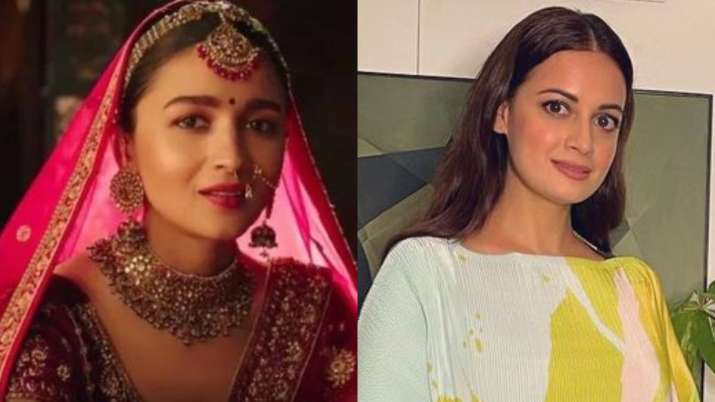
Alia Bhatt’s ad sparks debate over relevance of ‘Kanyadaan’ wedding ceremony: Dia Mirza and others react
The bride, beautiful, radiant and red in color, sits in front of the holy fire, her family, the groom and her parents swaying around her like a wind of love. And in that arguably most precious moment, she looks into the camera and asks why a woman should be reviled through the practice of ‘Kanyadaan’, which literally means ‘donating a daughter’.
Advertisement for a lehenga featuring a Bollywood star Alia Bhatt As the much-awaited daughter and granddaughter gave birth to a daughter, the age-old tradition has sparked debate on social media platforms and elsewhere.
Many call it Hindu phobic for objecting to a ritual that is part of the fabric of society, others applauding it for calling out the patriarchy that underlies the practice and there are some who feel that it should have gone even further in rejecting it.
“There is an increasing number of young women who are starting to think about this issue, especially with increasing numbers joining the workforce, having access to ideas (through social media etc.) are important to the concept of ‘women in form’. This advertisement reflects that,” sociologist Sanjay Srivastava told PTI.
In the 1.41-minute ad, Bhatt, today’s self-confident woman who even takes selfies with her father on the ‘mandap’, recounts her lifetime of ‘otherness’ in a monologue – her beloved grandmother says she would one day When people used to call him “paraya dhan” (foreign property) and his mother used to call him ‘chidiya’, his father did not react, which would one day fly away.
The Manyavar ad ends with the groom’s parents also attending the ritual (though it is not clear whether they too are giving their son) and Bhatt’s bride saying that it is ‘kanyaman’ (for the girl child). Respect) and not ‘Kanyadaan’. , and was asking, “Am I a given item?” His anger finds wide resonance.
Actor Dia Mirza, who decided to do away with the rituals of both “bidai” and “kanyadaan” after her marriage to businessman Vaibhav Rekhi, said she wanted the wedding to reflect her “beliefs and not old ideas.”
“None of us believe that women are things to be given or ‘donated’. Women have agency, selfishness and can make their own decisions about their lives, so my marriage is absolutely This shows that rituals like ‘Kanyadaan’ have not been included.” The actor told PTI.
She also included a female priest for her marriage to emphasize gender equality.
The actor, who is also the UN’s National Goodwill Ambassador from India, said, “It is time for young couples to define how they want to get married and if their ceremony is really about their personality and love for each other. representative of.”
Of course, the ceremony of giving to the bride is not just about Hindu weddings. It is also an important part of a Christian wedding service where the father walks down the aisle with his daughter and “hands it over” to the waiting groom.
Growing up on a diet of tradition and popular culture, including both Indian and Western films, many women have now begun to question the patriarchal traditions of marriage ceremonies in societies.
Mumbai-based IT analyst Meghna Trivedi, who got married in February last year, said the ritual of “kanyadaan” has no meaning in today’s day and age, but one has to undergo the ritual anyway.
Trivedi, a Gujarati who is married to a Punjabi, said that he asked the priest to find another way, but he said that ‘kanyadaan’ was a ‘must have’.
What you mean by “Kanyadaan” is that you are giving your daughter to someone else and it is something that you have to do in your life and it is related to your duties as a parent that now your daughter is in another family. from,” she told PTI.
“But I am my parents’ daughter even after marriage. ‘Kanyadaan’ is like you are giving it to me and now you have nothing to do with me. You are breaking ties like I am basically an object That you are giving. My parents understood it but the point was ‘how it is, is and will be’.
actor Kangana Ranaut Among those who disagreed. Criticizing the ad in an Instagram post, she said, “Humble request to all brands. Don’t use religion, minority, majority politics to sell things. Stop associating the gullible consumer with clever divisive concepts and advertising.” Please stop making fun of Hindus and their rituals.”
One of the Twitter users echoed similar sentiments.
The user wrote, “Our traditions are not regressive, your mindset certainly is! Kanyadaan is a sacred tradition, where a father/parent with their most precious and cherished daughter, a passionate moment full of hopes, promises and dreams It happens.”
Women’s rights activist Shabnam Hashmi said the attack on the ad “reflects the highly patriarchal mindset of our society”.
“It is a very progressive advertisement and raises important questions of women’s dignity and equality,” Hashmi told PTI.
Sociologist Srivastava said people reacted negatively as intolerance towards anything that questions ‘Indian traditions’ is on the rise.
The response, he said, also reflects a “male concern” about the changes taking place apart from the current climate, where it has become difficult to question anything Indian/Hindu.
There were also those who felt that advertising did not go far enough.
“There should be an idea not to perpetuate this tradition, but to break away from it,” said a young woman who welcomed the ad and questioned the tradition. In this. A radical break in sending the message would have been more effective”, she said.
.